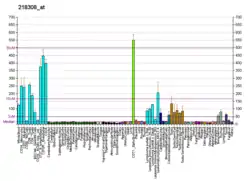TACC3
Transforming acidic coiled-coil-containing protein 3 is a protein that in humans is encoded by the TACC3 gene.[5][6]
The function of this gene has not yet been determined; however, it is speculated that it may be involved in cell growth and differentiation. Expression of this gene is up-regulated in some cancer cell lines, and in embryonic day 15 in mice.[6]
References
- GRCh38: Ensembl release 89: ENSG00000013810 - Ensembl, May 2017
- GRCm38: Ensembl release 89: ENSMUSG00000037313 - Ensembl, May 2017
- "Human PubMed Reference:". National Center for Biotechnology Information, U.S. National Library of Medicine.
- "Mouse PubMed Reference:". National Center for Biotechnology Information, U.S. National Library of Medicine.
- Schneider L, Essmann F, Kletke A, Rio P, Hanenberg H, Wetzel W, Schulze-Osthoff K, Nurnberg B, Piekorz RP (Oct 2007). "The transforming acidic coiled coil 3 protein is essential for spindle-dependent chromosome alignment and mitotic survival". J Biol Chem. 282 (40): 29273–83. doi:10.1074/jbc.M704151200. PMID 17675670.
- "Entrez Gene: TACC3 transforming, acidic coiled-coil containing protein 3".
Further reading
- Lappin TR, Mullan RN, Stewart JP, et al. (2003). "AINT/ERIC/TACC: an expanding family of proteins with C-terminal coiled coil domains". Leuk. Lymphoma. 43 (7): 1455–9. doi:10.1080/1042819022386644. PMID 12389629. S2CID 2098614.
- Maruyama K, Sugano S (1994). "Oligo-capping: a simple method to replace the cap structure of eukaryotic mRNAs with oligoribonucleotides". Gene. 138 (1–2): 171–4. doi:10.1016/0378-1119(94)90802-8. PMID 8125298.
- Suzuki Y, Yoshitomo-Nakagawa K, Maruyama K, et al. (1997). "Construction and characterization of a full length-enriched and a 5'-end-enriched cDNA library". Gene. 200 (1–2): 149–56. doi:10.1016/S0378-1119(97)00411-3. PMID 9373149.
- Still IH, Vince P, Cowell JK (1999). "The third member of the transforming acidic coiled coil-containing gene family, TACC3, maps in 4p16, close to translocation breakpoints in multiple myeloma, and is upregulated in various cancer cell lines". Genomics. 58 (2): 165–70. doi:10.1006/geno.1999.5829. PMID 10366448.
- Gergely F, Karlsson C, Still I, et al. (2001). "The TACC domain identifies a family of centrosomal proteins that can interact with microtubules". Proc. Natl. Acad. Sci. U.S.A. 97 (26): 14352–7. doi:10.1073/pnas.97.26.14352. PMC 18922. PMID 11121038.
- McKeveney PJ, Hodges VM, Mullan RN, et al. (2001). "Characterization and localization of expression of an erythropoietin-induced gene, ERIC-1/TACC3, identified in erythroid precursor cells". Br. J. Haematol. 112 (4): 1016–24. doi:10.1046/j.1365-2141.2001.02644.x. PMID 11298601. S2CID 27869385.
- Piekorz RP, Hoffmeyer A, Duntsch CD, et al. (2002). "The centrosomal protein TACC3 is essential for hematopoietic stem cell function and genetically interfaces with p53-regulated apoptosis". EMBO J. 21 (4): 653–64. doi:10.1093/emboj/21.4.653. PMC 125348. PMID 11847113.
- Steadman BT, Schmidt PH, Shanks RA, et al. (2002). "Transforming acidic coiled-coil-containing protein 4 interacts with centrosomal AKAP350 and the mitotic spindle apparatus". J. Biol. Chem. 277 (33): 30165–76. doi:10.1074/jbc.M201914200. PMID 12015314.
- Strausberg RL, Feingold EA, Grouse LH, et al. (2003). "Generation and initial analysis of more than 15,000 full-length human and mouse cDNA sequences". Proc. Natl. Acad. Sci. U.S.A. 99 (26): 16899–903. doi:10.1073/pnas.242603899. PMC 139241. PMID 12477932.
- Sadek CM, Pelto-Huikko M, Tujague M, et al. (2004). "TACC3 expression is tightly regulated during early differentiation". Gene Expr. Patterns. 3 (2): 203–11. doi:10.1016/S1567-133X(02)00066-2. PMID 12711550.
- Leonard D, Ajuh P, Lamond AI, Legerski RJ (2003). "hLodestar/HuF2 interacts with CDC5L and is involved in pre-mRNA splicing". Biochem. Biophys. Res. Commun. 308 (4): 793–801. CiteSeerX 10.1.1.539.8359. doi:10.1016/S0006-291X(03)01486-4. PMID 12927788.
- Gangisetty O, Lauffart B, Sondarva GV, et al. (2004). "The transforming acidic coiled coil proteins interact with nuclear histone acetyltransferases". Oncogene. 23 (14): 2559–63. doi:10.1038/sj.onc.1207424. PMID 14767476.
- Beausoleil SA, Jedrychowski M, Schwartz D, et al. (2004). "Large-scale characterization of HeLa cell nuclear phosphoproteins". Proc. Natl. Acad. Sci. U.S.A. 101 (33): 12130–5. doi:10.1073/pnas.0404720101. PMC 514446. PMID 15302935.
- Gerhard DS, Wagner L, Feingold EA, et al. (2004). "The status, quality, and expansion of the NIH full-length cDNA project: the Mammalian Gene Collection (MGC)". Genome Res. 14 (10B): 2121–7. doi:10.1101/gr.2596504. PMC 528928. PMID 15489334.
- Beausoleil SA, Villén J, Gerber SA, et al. (2006). "A probability-based approach for high-throughput protein phosphorylation analysis and site localization". Nat. Biotechnol. 24 (10): 1285–92. doi:10.1038/nbt1240. PMID 16964243. S2CID 14294292.
This article is issued from Wikipedia. The text is licensed under Creative Commons - Attribution - Sharealike. Additional terms may apply for the media files.




